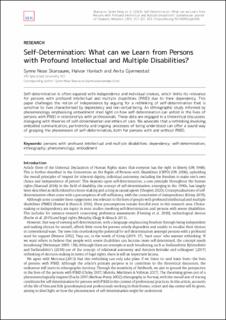Self-Determination: What can we learn from persons with profound intellectual and multiple disabilities?
Peer reviewed, Journal article
Published version
Permanent lenke
https://hdl.handle.net/11250/2828372Utgivelsesdato
2021Metadata
Vis full innførselSamlinger
Originalversjon
http://doi.org/10.16993/sjdr.830Sammendrag
Self-determination is often equated with independence and individual choices, which limits its relevance for persons with profound intellectual and multiple disabilities (PIMD) due to their dependency. This paper challenges the notion of independence by arguing for a rethinking of self-determination that is sensitive to lives characterised by dependency and non-verbal being. An ethnographic study informed by phenomenology emphasising embodiment shed light on how self-determination can unfold in the lives of persons with PIMD in relationships with professionals. These data are engaged in a theoretical discussion, dialoguing with theories of self-determination and ethics of care. We advocate that a rethinking involving embodied communication, partnership and ongoing processes of being understood can offer a sound way of grasping the phenomenon of self-determination, both for persons with and without PIMD.

